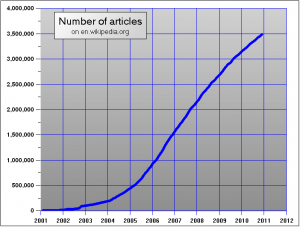In college, I remember being told to never cite Wikipedia as a reference when writing up an essay or report. Literally anyone (and their mom) can contribute to Wikipedia, so believing its content is an exercise of faith in collective human intelligence. Though you still shouldn’t cite Wiki as a source, this online encyclopedia is becoming more and more relied upon as a first pass source of information.
As the graph above shows, the number of Wikipedia articles has skyrocketed over the last few years. Many of these articles include ones about highly specialized science topics. For example, search Google for “C-H activation”. The first hit is the Wikipedia page!
I confess, I use Wikipedia almost every day at work. It’s a convenient (and hopefully reliable) way to quickly look up boiling points, molecular weights, and CAS numbers of common chemicals.
But how much of the Wiki content on specialized topics is actually written by the experts in the field? Probably not that much. A letter published in the current issue of Nature challenges scientists to step it up and start contributing to Wikipedia:
Like it or not, other scientists and the public are using [Wikipedia] to get an overview of your specialist area. . . . Scientists who receive public or charitable funding should therefore seize the opportunity to make sure that Wikipedia articles are understandable, scientifically accurate, well sourced and up-to-date.
The writers of this letter, Alex Bateman and Darren Logan, are at the Wellcome Trust Sanger Institute in the UK. Scientists at this institute have a very pragmatic attitude toward Wikipedia’s popularity as an information source. Every Tuesday, a group of them get together and write Wikipedia articles (according to this earlier Nature News piece). On a similar note, some universities are starting to have Wikipedia clubs (such as this one) to encourage educated students to responsibly write and edit articles.
So if you’re a scientist, and you really want to contribute to public knowledge in your area of expertise, Wikipedia is kind of the perfect venue. There’s no personal glory in it (yet?), but a Google search will probably bring up your Wikipedia article as the number one hit.



Continuing to check this blog for any further drama relating to Brazilian Blowout Blowup and finding instead a workaday (though quite sensible) article relating to Wikipedia, I turned to the latter to look for any reference to the Brazilian Blowout Blowup and the effort was fruitful. Here is one quote from the authoritative(?) (aside from multiple issues and need of more references and very few or no other articles linking to it) Wikipedia article: “Brazilian Blowout refuses to release their product’s ingredient list, as required by law” and “Despite providing no evidence to support such claims, Brazilian Blowout continues to aggressively market their products as 100% safe and formaldehyde free.”
The Wikipedia article is titled Brazilian Hair Straightening and its address is http://en.wikipedia.org/wiki/Brazilian_hair_straightening
Sorry I haven’t found more gossip about BB yet! I’m sure something is brewing; there are multiple pending court cases. I will keep my eyes peeled.
In the meantime, way to go integrating the topic of the current post with the topic of previous posts!
You are welcome (for the segue).
Nice points! i was annoyed a while ago to discover the page for ‘Bioorganic Chemistry’ is practically a stub, while ‘Bioinorganic Chemistry’ is a well-written and thought-out description of the field. but we really have ourselves to blame if more of us don’t take the time to contribute. (i don’t even have an account!) good job by the WTSI!